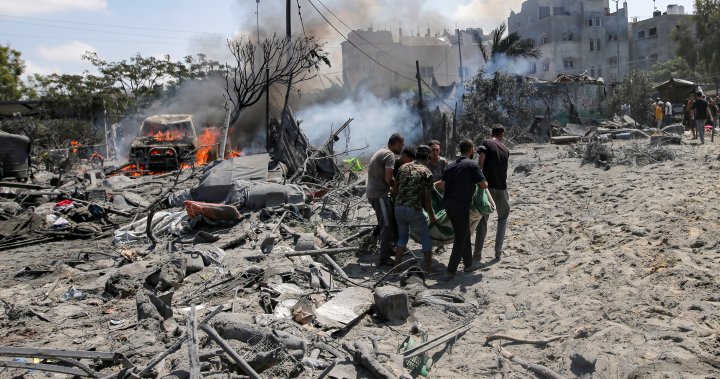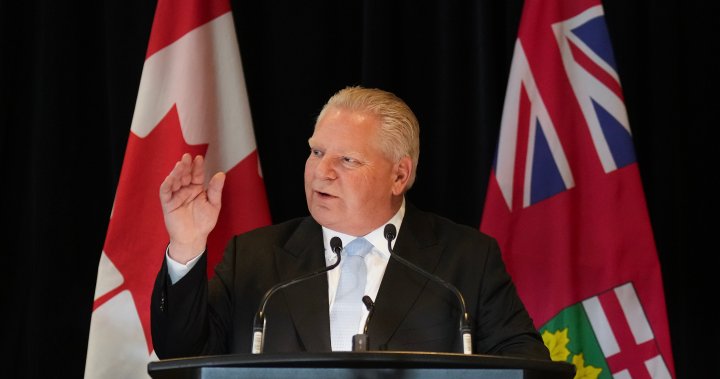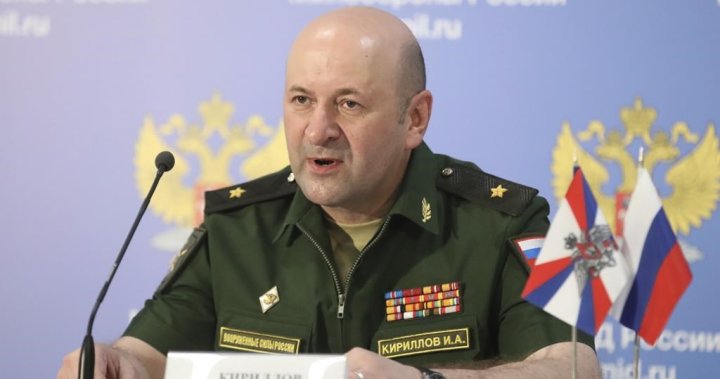The Israeli military said Thursday that it has confirmed that the head of Hamas’ military wing, Mohammed Deif, was killed in an airstrike in Gaza in July. The announcement comes a day after an apparent Israeli strike in the Iranian capital killed Hamas’ top political leader.
The rapid events this week have left U.S., Egyptian and Qatari mediators scrambling to salvage talks for a cease-fire deal in Gaza. At the same time, international diplomats were trying to avert an escalation into all-out regional war after the assassination in Tehran of Hamas’ Ismail Haniyeh, Israel’s killing of a top Hezbollah commander in a Beirut strike and – now – Israel’s announcement of Deif’s death.
There was no immediate comment on the Israeli claim by Hamas, which had previously said Deif survived the July strike in Gaza. A member of Hamas’ political bureau, Izzat al-Risheq, said in a statement Thursday that confirming or denying his death is the responsibility of the armed wing, known as the Izzedin al-Qassam Brigades, which so far was silent.
The elimination of Haniyeh and Deif — two of Hamas’ most senior figures — brings a victory for Israeli Prime Minister Netanyahu. It also puts him at a crossroads.

It potentially presents him with a political off-ramp to end the conflict, allowing him to retreat from his lofty promises of “total victory” while showing Israelis that Hamas’ military capabilities suffered a debilitating blow.
It could also lead him to harden Israel’s position in cease-fire talks, with Israeli officials insisting the blows to Hamas will force it to compromise. Hamas too could dig in as well in the talks — or quit them entirely.
Israel believes that Deif, the head of Hamas’ military, and Yahya Sinwar, the top Hamas leader in Gaza, were the chief architects of the Oct. 7 attack that killed some 1,200 people in southern Israel and triggered the Israel-Hamas conflict. Sinwar is believed to remain in hiding in Gaza.
Israel targeted Deif in a July 13 strike that hit a compound on the outskirts of the southern Gaza city of Khan Younis. The military said at the time that another Hamas commander, Rafa Salama, was killed. More than 90 other people, including displaced civilians in nearby tents, were killed in the strike, Gaza health officials said at the time.

In a statement Thursday, the Israeli military said that “following an intelligence assessment, it can be confirmed that Mohammed Deif was eliminated in the strike.”
The email you need for the day’s
top news stories from Canada and around the world.

Get daily National news
Get the day’s top news, political, economic, and current affairs headlines, delivered to your inbox once a day.
In its 10-month-old campaign of bombardment and offensives in Gaza, Israel has killed some 39,480 Palestinians and wounded more than 91,100 others, according to Gaza’s Health Ministry, whose count does not differentiate between civilians and combatants. More than 80% of the population of 2.3 million have been driven from their homes, the vast majority crammed into tent camps in the southwest corner of the territory, with limited food and water.
So far Netanyahu has said he is determined to continue the war until Hamas is destroyed. Far-right nationalist coalition partners, on whom he relies to stay in power, have threatened to bolt the government if he halts the conflict.
After the announcement on Deif, far-right Finance Minister Bezalel Smotrich said the “defeat of Hamas is closer than ever.” He said the military would continue to “eliminate thousands of other terrorists until our security is restored and we bring the hostages home.”
Israeli Defense Minister Yoav Gallant said the strike that killed Deif was a “significant milestone” toward achieving the goals of the war. “The results of this operation reflect that Hamas is an organization in disintegration,” he wrote on X.
Deif was one of the founders of Hamas’ military wing, the Qassam Brigades, in the 1990s. He led the unit for decades through campaigns of suicide bombings against Israeli civilians, volleys of rocket fire into Israel, and repeated past Israeli assaults on Gaza since Hamas took power there in 2007.

He remained a mysterious, underground figure in Gaza. He never appeared in public, was hardly ever photographed and only rarely was his voice heard in audio statements. He survived a string of Israeli assassination attempts.
Haniyeh’s killing in particular threw into disarray months of efforts at reaching a deal for a cease-fire in Gaza and a hostage release. Haniyeh had been a main negotiator in those talks.
Qatari and Egyptian officials had tense exchanges with U.S counterparts over the assassination, said an Egyptian official with direct knowledge of the talks, speaking on condition of anonymity to discuss the internal discussions.
While the U.S. has been pressing Egyptian and Qatari mediators to get Hamas to compromise, the Americans can’t “pressure the other party, Israel to … refrain from provocative acts,” the Egyptian official said, calling the assassination “reckless.”

Qatar’s prime minister, Mohammed bin Abdulrahman bin Jassim Al Thani, expressed frustration in a post on social media, saying: “Can mediation succeed when one party assassinates the negotiator on the other side?”
U.S. Secretary of State Antony Blinken said Wednesday that the U.S. had no prior knowledge of the strike in Tehran that killed Haniyeh.
The Egyptian official said no deal was likely in the near future since Hamas must now name Haniyeh’s replacement. Mediators had been waiting for Hamas’ response on the latest version of the deal. Instead, after Haniyeh’s funeral, expected Friday, he said they will reach out to Hamas officials to explore the next steps.
After Haniyeh’s assassination, Iran has vowed revenge against Israel, and the killing of Hezbollah commander Fouad Shukur in Beirut could also bring reprisals — raising fears of a wider spiral of escalation.
The Egyptian official now said the priority was preventing full-scale war.
Magdy reported from Cairo.





